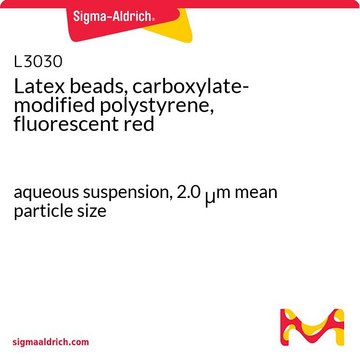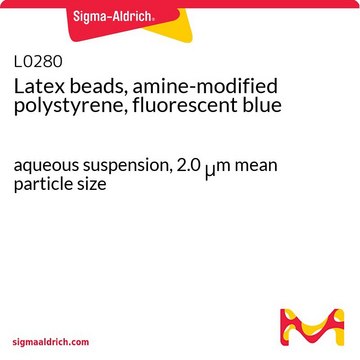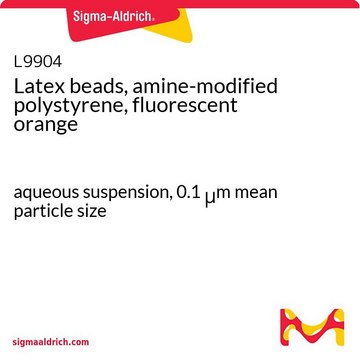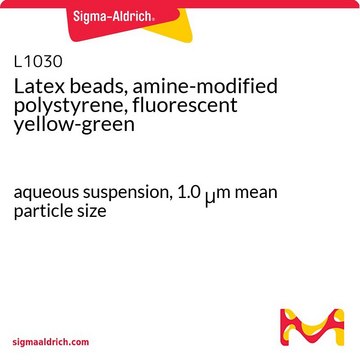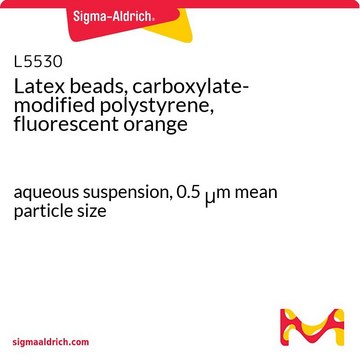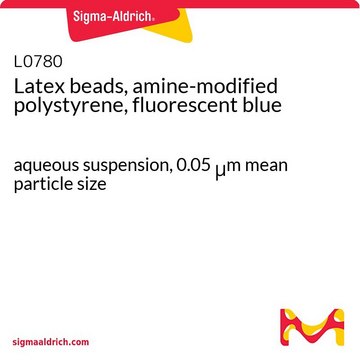L9529
Latex beads, amine-modified polystyrene, fluorescent orange
aqueous suspension, 2.0 μm mean particle size
Se connecterpour consulter vos tarifs contractuels et ceux de votre entreprise/organisme
About This Item
Produits recommandés
Forme
aqueous suspension
Niveau de qualité
Composition
Solids, 2.4-2.6%
Taille moyenne des particules
2.0 μm
Fluorescence
λex ~520 nm; λem ~540 nm
Vous recherchez des produits similaires ? Visite Guide de comparaison des produits
Application
Latex beads, amine-modified polystyrene, fluorescent orange has been used in functionalized microbeads for rapid antimicrobial susceptibility testing (AST) evaluation. It has also been used in microparticle functionalization for the detection of live bacteria.
Actions biochimiques/physiologiques
Amine-modified polystyrene latex beads have been used to develop an electrochemical nitrite nanosensor as well as to validate a pharyngeal aspiration technique for exposing the mouse lung to respirable particles.
Code de la classe de stockage
10 - Combustible liquids
Classe de danger pour l'eau (WGK)
WGK 3
Point d'éclair (°F)
Not applicable
Point d'éclair (°C)
Not applicable
Certificats d'analyse (COA)
Recherchez un Certificats d'analyse (COA) en saisissant le numéro de lot du produit. Les numéros de lot figurent sur l'étiquette du produit après les mots "Lot" ou "Batch".
Déjà en possession de ce produit ?
Retrouvez la documentation relative aux produits que vous avez récemment achetés dans la Bibliothèque de documents.
Les clients ont également consulté
J Geys et al.
Toxicology letters, 160(3), 218-226 (2005-09-03)
Recent studies indicate that inhaled ultrafine particles can pass into the circulation. To study this translocation in an in vitro model three types of pulmonary epithelial cells were examined. The integrity of the cell monolayer was verified by measuring the
Ninad Mehendale et al.
Biomedical microdevices, 20(1), 6-6 (2017-12-01)
Pillar-based microfluidic sorting devices are preferred for isolation of rare cells due to their simple designs and passive operation. Dead-end pillar filters can efficiently capture large rare cells, such as, circulating tumor cells (CTCs), nucleated red blood cells (NRBCs), CD4
Jhih-Cheng Wang et al.
ACS sensors, 3(10), 2182-2190 (2018-09-18)
Rapid detection of bacteria and their susceptibility to specific antibiotics plays a vital role in microbial infection treatments. Antimicrobial susceptibility testing (AST) is a common measure to select effective drugs. However, the conventional practices, such as broth dilution, E-test, and
G V S Rao et al.
Journal of toxicology and environmental health. Part A, 66(15), 1441-1452 (2003-07-15)
Recent studies have demonstrated that the mouse lung can be exposed to soluble antigens by aspiration of these antigens from the pharynx. This simple technique avoids the trauma associated with intratracheal instillation. In this study, the pharyngeal aspiration technique was
Electrochemical nitrite nanosensor developed with amine- and sulphate-functionalised polystyrene latex beads self-assembled on polyaniline
Muchindu, M., et al.
Electrochimica Acta, 55, 4274-4280 (2010)
Notre équipe de scientifiques dispose d'une expérience dans tous les secteurs de la recherche, notamment en sciences de la vie, science des matériaux, synthèse chimique, chromatographie, analyse et dans de nombreux autres domaines..
Contacter notre Service technique